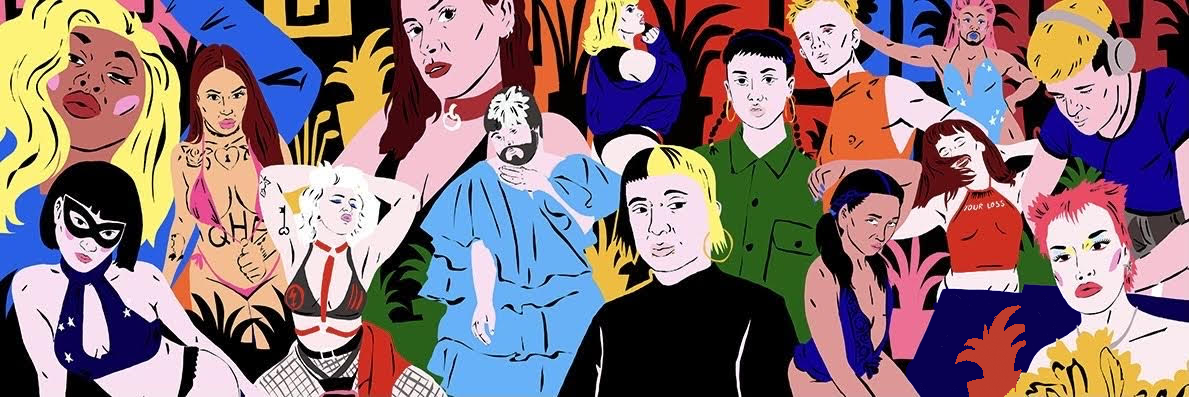Queer People Have Had to Rely on Each Other This Year, and Christmas Is No Exception
by Harry Gay
25 December 2020

While queer isolation, especially around Christmas, predates the coronavirus pandemic, Covid-19 restrictions mean that many LGBTIQ+ people have had their long-standing strategies for surviving the holiday period taken away this year.
Historically queer spaces have provided a sense of belonging to LGBTIQ+ people during the Christmas period and in lieu of their biological families, many have turned to their chosen families and community for support. This is crucial to many, for whom “home” is not a place of comfort but of trauma; going back for Christmas might mean a return to the homophobic town you ran away from or a week with people who don’t respect your pronouns. One in eight LGBTIQ+ people sees their biological family less than once a year. One in four homeless young people identify as LGBTIQ+ and of those, 77% say they became homeless after being rejected by their family.
In the past, being able to connect with other people who have a shared experience has been vital for surviving the Christmas period – whether that be by accessing one of London’s LGBT+ community centres, heading to a support group or going out with friends to see a drag show. But this year the closure of almost all venues and the pressure on people to reduce household mixing has left many LGBTIQ+ people looking at a lonely Christmas.
Lockdown has compounded a decade of austerity.
Lockdown and isolation have already had a serious impact on the queer community. The mental anguish of growing up in a queerphobic society leaves LGBTIQ+ people seven times more likely to abuse drugs and alcohol and much less likely to seek support from conventional services. Research into the wellbeing of queer people during the pandemic found that 18% of respondents felt the lockdown had led to substance or alcohol misuse, or it had triggered a relapse.
Switchboard is an LGBTIQ+ information and support helpline that has been a free lifeline to the queer community since 1974. Throughout the pandemic, the organisation has reported an increase in calls by a third, with 44% more conversations where people were struggling and 57% more conversations about loneliness and isolation.
The Outside Project, where I work, is an LGBTIQ+ homelessness organisation with a community centre and shelter in central London. The project is one of the only queer organisations that continued to do vital face-to-face work throughout lockdown while also expanding its services by opening emergency bed spaces and a specialist refuge for people who have experienced domestic abuse and violence. It will be open throughout the Christmas period, but it will have to scale back its community Christmas dinner because of Covid-19.
Services like Switchboard and the Outside Project were already strained when the pandemic began, following a decade of austerity and cuts that have contributed to the closure of LGBTIQ+ services and 58% of queer venues. In lieu of adequate support from the government, it’s grassroots organisations and individual volunteers that have been putting in the work to keep the queer community safe. It’s the outreach workers who have continued to deliver vital face-to-face services for people who have lost their homes during Covid-19, it’s the self-employed drag queens who have kept everyone entertained, and the queers on zero-hour contracts who have dropped shifts to set up, and run mutual aid groups.
In the spring, when mutual aid groups were rapidly set up to plug a gap where state support was missing, one of the largest was the London LGBTIQ+ group, with over 2,000 members who either needed support or wanted to volunteer their time to help strangers from their community. While the majority of support has now moved online, for months the group has been connecting neighbours at a local level to carry out practical and in-person tasks.
While LGBTIQ+ services are stretched to their limit responding to the immediate crisis, queers have found new ways to connect online. At the beginning of the first lockdown, I was part of a group to set up Queer House Party, an idea to fill the void that had been left behind by the closure of queer clubbing and community spaces. Initially, the Zoom party attracted thousands of people each week and, months on, the reasons for our success are clear. We made it a free, accessible, and radical space that platforms working class, black, brown, disabled, and sex-worker performers who have lost out on their income rather than showcasing big names and flashy queens. For Christmas Day, Queer House Party is working with drag queens and sex workers to create a free event in response to widespread isolation and loneliness within the queer community that will be felt even more deeply in the middle of a pandemic.
During the height of the HIV/AIDS crisis, in the absence of government direction or support, it was friends and families who created networks, organisations and structures to care for people with the virus. This pandemic has been no different. The past nine months have shown that once again queer people cannot rely on government support and must take care of each other.
Although the queer community has suffered, we are resilient. And when Covid-19 is over and we take to the street again, It’s vital that we stand side by side with the grassroots community groups who have long been fighting for our rights to hold the government to account over its failings.
Harry Gary is a DJ, Campaigner and Community Organiser from South East London.